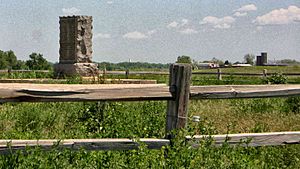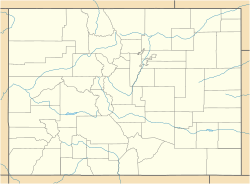Fort Saint Vrain facts for kids
Quick facts for kids
Fort Saint Vrain
|
|
|---|---|
|
Trading post and fort
|
|

Historical marker at the site of Fort Saint Vrain
|
|
| Nickname(s):
Fort George, Fort Lookout
|
|
| Country | United States |
| State | Colorado |
| County | Weld |
| Nearest town | Platteville |
| Named for | Ceran St. Vrain |
| Elevation | 4,764 ft (1,452 m) |
Fort Saint Vrain was an important trading post built in 1837. It was a place where people traded goods, especially furs. The fort was built by a company called the Bent, St. Vrain Company. You could find it where Saint Vrain Creek meets the South Platte River. This spot was about 20 miles (32 km) east of the Rocky Mountains. Today, this area is in Weld County, Colorado.
A special marker shows where the old fort once stood. It is about seven miles north of Fort Vasquez, Colorado. The fort was named after Ceran St. Vrain, who helped start it.
Contents
Building the Fort
A Place for Trade
William Clark, who was a governor at the time, gave the Bent, St. Vrain Company permission to trade. This happened on November 8, 1836. The fort was built like other forts nearby. It had two stories and strong adobe walls. Adobe is a building material made from earth and organic materials. These walls surrounded an open area inside, like a courtyard.
The main purpose of Fort Saint Vrain was to trade. It was a busy place for Native American tribes and mountain men. These mountain men were skilled trappers who hunted animals for their furs. The fort looked a lot like the adobe buildings at Fort Vasquez and Bent's Old Fort.
People at Fort Saint Vrain
Important Workers and Visitors
Marcellin St. Vrain, who was Ceran's brother, was in charge of the trading post. Many interesting people worked there. One famous person was James Beckwourth, a well-known mountain man. Another was Jean Baptiste Charbonneau. He was the son of Sacajewea, a famous Native American woman.
Sacagawea was a guide and translator for the Lewis and Clark Expedition from 1804 to 1806. She traveled with her husband, Toussaint Charbonneau, and her newborn son, Jean Baptiste. She was very important because she could speak with the Shoshone Indian tribe.
What Happened Next
Changes and New Forts
After a big event called the Taos Revolt in 1847, both St. Vrain brothers went back to St. Louis. Later, Ceran St. Vrain sold his part of the Bent, St. Vrain Company. By 1849, William Bent owned the fort all by himself.
William Bent moved to Fort St. Vrain for a short time. Then, he built a brand new fort called Bent's New Fort in an area known as Big Timbers. This marked the end of Fort Saint Vrain's time as a major trading hub.
 | John T. Biggers |
 | Thomas Blackshear |
 | Mark Bradford |
 | Beverly Buchanan |



